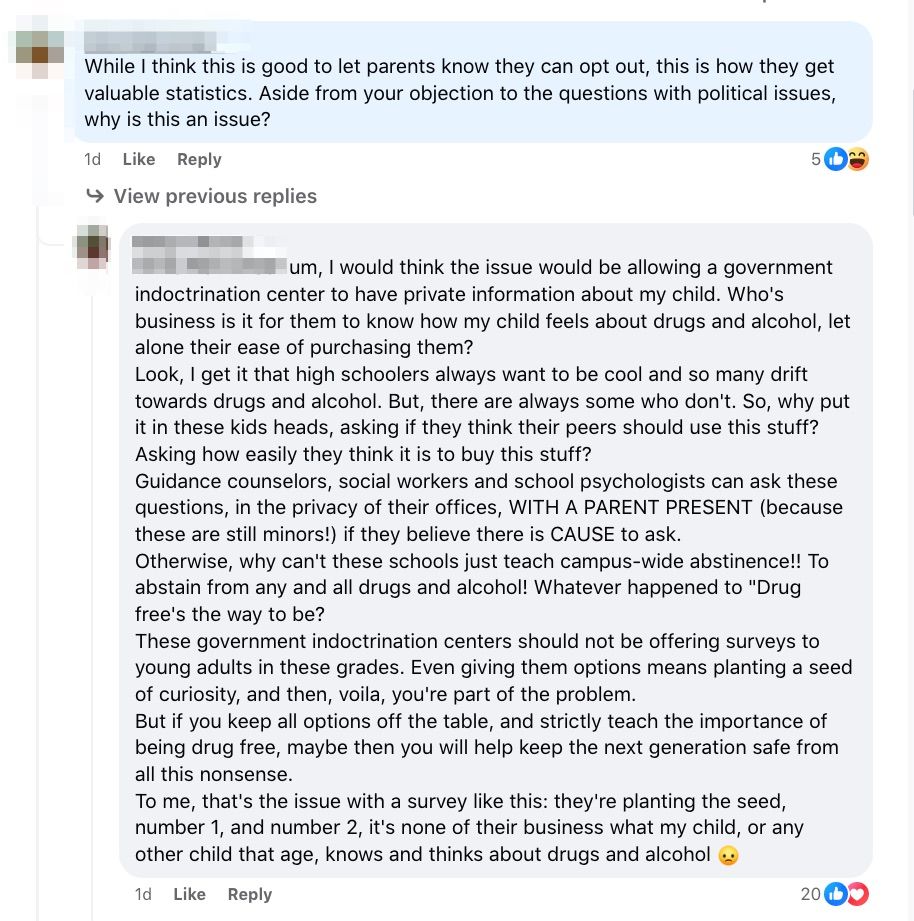We know that the groups and individuals behind book bans are angling for more than just books. The books are an easy target since they require significant investment on behalf of schools and libraries to move through a review process. Books have always been low-hanging fruit for censors throughout history because they represent information, they represent ideas, and they represent the world around us. We must keep in mind that while book banning is one big issue unto itself, it’s but a branch on the larger tree to systematically topple publicly funded, democratic institutions like schools and libraries.
But one thing that has not quite been touched enough related to the targeting of these institutions is this: far-right groups seeking book bans, eliminating trans bathroom rights, eliminating trans sports rights, canning diversity equity and inclusion initiatives, and ending social-emotional learning, among other things, have been purposefully targeting surveys designed to help understand who our current generation of young people really are, including their beliefs, their identities, and their dreams, goals, and desires for the future before them.
Thanks to PEW Research, we know that as of 2021, one-quarter of today’s teens openly identify somewhere beneath the LGBTQ+ umbrella. PEW is also responsible for shedding insight into the racial diversity of today’s young people. 52% of teenagers are white and non-Hispanic, compared to 61% of Millennials when they were teenagers; 70% of Generation X when they were teenagers; and 82% of Boomers when they were teenagers. One-quarter of today’s teens are Hispanic, while 14% are Black, 6% are Asian, and 5% have two or more racial identities. Roughly 6% of today’s teens are immigrants, and 22% are the children of immigrants. That information is as of 2020. This kind of data is not only useful for understanding young people’s everyday experiences in the classroom, but it’s essential for ensuring that today’s culture reflects and shares that diversity. A 1990s curriculum or library collection does not appropriately serve 2024 students.
That is precisely why there has been a major push for the last several years by the same people banning books to opt their young people out of surveys distributed by educational institutions. These surveys are how groups like PEW and others learn about a large swath of people. The information gathered is anonymous and meant to provide insight into our ever-changing demographics.
To be clear, these surveys are not only useful for PEW. They’re used by researchers across many institutions and organizations. But just as people angle to ban books they don’t want kids to have access to, falsehoods and mischaracterizations about these surveys abound. There is this idea these surveys are not only indoctrination but that they “target” kids and “steal” their information. Neither of these is true, of course, but truth has never been a concern here.
|
|
Pictured above is the first page of one of these surveys. This is the Illinois Youth Survey, distributed to 8th graders at participating schools; you can look at the entire survey here. The survey was created by the Illinois Department of Health to gather health and social data, which helps in so many capacities. Not only do we get a sense of things like changing demographics of today’s youth. We also are able to see trends in health — are kids smoking fewer cigarettes but using vapes more than the same kids ten years ago? Are more kids living in “non-traditional” households? This kind of data helps the government figure out what initiatives to fund in order to meet the needs of its people.
Book banners push for opting out of these surveys under the belief that the government is trying to groom or indoctrinate their children because of health and social behavior questions. Does asking a student how they identify make them suddenly change their gender? It doesn’t. If asking anyone a basic question were enough to entice them to change themselves, therapy would be a lot cheaper, quicker, and accessible to all — it could come in the form of a questionnaire.
As parents push to end survey use, they skew the data. Skewing the data erases reality — and it’s particularly perplexing because it seems like the opt-out contingent would be proud to have their students’ voices heard if their “strong Christian family values” were carried forward with their children. But perhaps that’s just it. The fear that their students may identify or report living through experiences that aren’t the ones being pushed by their parents is why they want their kids to opt out. They’d rather silence their own children’s voices than have those same children have a voice at all.
 |
Moreover, this opt-out push obfuscates what can be known, studied, and explained about young people. If enough parents opt their kids out of the surveys, then those same parents do two things. First, they can point to data and say it isn’t representative because it only shows the information from the parents who didn’t protect their rights and opt their child out (i.e., “you keep saying 25% of today’s teenagers are LGBTQ+ but you’re only asking the kids who would say that”). Then, they can say that the data used to help guide curriculum and collection decisions is indoctrination because it does not take their specific beliefs into account. They own the cycle.
Those are, of course, the same people who parrot the lies that today’s kids can’t read at grade level and point to standardized test scores — data acquired exactly the same way.
Book banners don’t want to know the truths their kids live because it strips them, the parents, of their power. So, to hold onto that power, they aid in erasing the truths of an entire generation out of fear that their own kid might fill in a bubble that mom or dad believes should be eradicated altogether.
It’s hard to know the truth when, at every turn, they’re working hard to make the truth impossible to find.
Book Censorship News: February 16, 2024
- “Tax-funded libraries within Kenosha County [WI] could have adult-only sections inside their buildings this year under a proposal that seeks to protect children from materials deemed pornographic.” This is going to keep spreading, and it shouldn’t be surprising to anyone.
- South Carolina is one step closer to the State Board of Education determining what books can and cannot be in school libraries across the state.
- Georgia educators have filed a sex discrimination lawsuit against the Cobb County School District (GA) following the firing of an educator who read a book about gender in her classroom.
- In Miami-Dade County Schools (FL), parents had to sign a permission slip for their students to listen to a story written by a Black author in class.
- St. Louis Park schools (MN) will allow parents to opt their students out of LGBTQ+ books.
- One Lee County (FL) school teacher explained that he resigned from his job earlier this school year because he walked into his classroom and saw the 600 books on his shelves were pulled for review. Recall in this county, the school media specialists have to go through every single book in the school to determine if it is appropriate.
- The Mat-Su Schools (AK) library review committee has made some recommendations on the 60 books being challenged in the district. More discussions and final decisions to come, but a lot of books are going to be pulled here.
- No surprise, the 11 books a local elected official wants removed from the Petal Public Library (AL) are all LGBTQ+ themed.
- Up north, 7 items were challenged in Ottawa Public Libraries (Ontario, Canada) last year. None were removed.
- This week, Catawba County Schools (NC) will reconsider whether or not to ban l8r g8r and The Carnival at Bray. But in a twist in this story, the person who complained withdrew the complaints before the meeting, so the books will remain.
- Iredell-Statesville Schools (NC) are still dealing with harassment from Moms For Liberty. This time, they were grilled over a partnership with the local public library that increases access to materials for students. This is apparently outrageous. The story here is about misinformation being wielded as a weapon.
- Daviess County Library (KY) spent $35,000 on reviewing materials in the collection after local crisis actors complained about 200 books. The library went through each title and ultimately elected to create age-restricted cards (fwiw, here’s why libraries need to exercise caution with this).
- Speaking of age-restricted cards, that’s new at Hillsborough County Public Libraries in Florida.
- Las Cruces School Board (NM) is allowing those who challenged Jack Of Hearts (and Other Parts) to challenge the book again. It was retained the last time.
- Oh, the woman who challenged 150 books in Dorchester District 2 (SC) doesn’t have a kid in the district? Color me shocked. BTW, here are all of the challenged books.
- Alachua County School Board (FL) will keep Melissa on shelves.
- “The latest effort at regulating ‘pornographic materials’ in Idaho public and school libraries will move forward. The overwhelming majority of testifiers at a public hearing Monday opposed SB 1289, many of whom argued it was unnecessary and potentially burdensome for some libraries and school districts.” Idaho legislators don’t care about their constituents but the far-right agenda.
- The fate of Me and Earl and the Dying Girl will be decided in MSAD 44 (ME) later this month.
- Dothan Houston County Library System (AL) is making it easier for books to be banned, and it’s also creating a new category of books that are shelved behind the checkout desk and only for those 19 and older. Sorry, 18-year-olds: you can go get killed in war, but you can’t borrow some books in your local library.
Source : Targeting Demographic Data to Skew Reality: Book Censorship News, February 16, 2024














